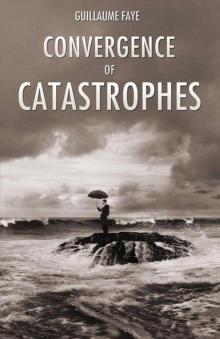Convergence of Catastrophes, page 2




• Believing that large-scale alien immigration is compatible with the ‘values of the French Republic’ and the preservation of the civilisation of the nations and peoples of Europe; and that Islam can become secular and blend in with republican values. Believing also that we can renew the working population by importing immigrants, when these immigrants are unskilled welfare recipients who become our responsibility. Imagining also that by regularising the status of masses of illegal immigrants, it will be possible to assimilate them and avoid the arrival of new masses, although we observe exactly the opposite. This is the illusion of the benefits of immigration.
• Extolling the assimilation and integration of aliens while wanting to preserve and maintain their special characteristics, their original cultures, their memories and native mores. This is the communitarian illusion, one of the most harmful of all, which is particularly cherished by ‘ethno-pluralist’ intellectuals.
• Imagining that by cancelling Third World debt we can encourage their economic growth and prevent new indebtedness in the future. This is the Third Worldist illusion.
• Demanding at one and the same time that we abandon nuclear energy programs and replace them with power plants using natural gas, coal and petroleum, while advocating the reduction of polluting gases. This is the ecologist’s illusion.
• Thinking that a world economy founded on short-term speculation based on computerised markets and replacing monetary policies with the caprice of financial markets will guarantee a lasting ‘new growth’. This is the illusion of the new economy.
• Believing that democracy and ‘republican values’ will be reinforced by eliminating ‘populism’, that is, the direct expression of the will of the people.
I could make the list longer. In all these matters, believing in miracles can be explained by the incorrigible optimism of the secular religion of egalitarian progressivism, but also by the fact that, although it has reached an impasse, the dominant ideology does not dare deny its dogmas or make heartbreaking revisions, while clinging to the idea that ‘the storm will never come’. The whole thing is explained by the sophisms of bogus experts, whose conclusions are always that everything is going well and getting better and that we have the situation under control. They are like a driver who speeds through a red light and justifies it by explaining that the faster he drives, the less time he spends in the intersection and therefore reduces the risk of a collision.
Man, a Sick Animal
Paul MacLean,[6] Konrad Lorenz,[7] Arthur Koestler,[8] and Jean Rostand[9] have sensed that man is a sick animal, endowed with a brain that is too large. Conscience is perhaps, on the evolutionary scale, an illness and intelligence a burden. Man has lost touch with his natural survival instincts. We have not been on the Earth for a long time and it may be that, from life’s point of view, or Gaïa’s,[10] we are a failed species, an abortive experiment; and that, especially by destroying the ecosystem that supports it, the suicidal human race is hastening its own disappearance.
Our neocortex, which some biologists compare to a tumour, does not function sufficiently in symbiosis with our reptilian brain. This is ‘cerebral schizo-physiology’, the source of a chaotic and self-destructive culture: wars, religious fanaticisms, frenzied exploitation of nature, aberrant demographic proliferation or, on the other hand, catastrophically low birth levels, frustrating natural selection, etc.: Homo sapiens sapiens does not deserve the name he has given himself. He is not ‘wise’, only intelligent. But he will perhaps perish from this excessive intelligence, which is pushing him to excess, hybris,[11] and is making him lose every instinct of collective survival and all capacity to ‘feel’ the dangers that are piling up.
The Golem Parable, or the Machine that Went Mad
Humanity has lost control of the forward rush of the technological and globalised civilisation born in the Nineteenth century. We should remember the parable of the Golem, the Jewish allegory from Prague, in which a mud figure brought to life by magic escapes its maker, becomes an autonomous and uncontrollable entity, and then starts spreading terror.
Today’s little Jules Vernes[12] are mistaken. Optimistic and short-sighted mechanics, they are only making the situation worse. More than that, they are not in control of the machine and have no idea where it is heading. There really is a pilot in the airplane, but he is convinced that he is driving a locomotive.
Among the inescapable trends at work today, there are other risks that are unforeseeable today but which will make things worse (or perhaps better, but this is less likely), or else create new tendencies or new earth-shattering phenomena. At any rate, it is hard to see any positive signs. All the indictors are flashing red.
In futurology, there are only two types of extrapolation from current trends that one can make with a high degree of probability: the weak and the strong. Today predictions are typically based on weak extrapolations. These latter are, for example, the pursuit of economic growth, linear and continuous technological progress, scientific civilisation, the affirmation of democracy everywhere in the world (who is telling us that Europe will be ‘democratic’ in 2030?); the lasting character of the United Nations; the effectiveness of antibiotics in the next century, and so on.
We are less concerned with strong extrapolations, which have a good chance of being realised in the next twenty years: the demographic disequilibrium of North and South that will grow massively; the unavoidable ageing of the indigenous European population; the growth of mass immigration into rich countries; the worsening of pollution, atmospheric warming and the exhaustion of resources, which is growing worse regardless of what measures may be taken today on a global level (and they are not being taken); the rising power of Islam; the worsening of social disintegration in Europe along ethnic lines, etc. All these strong extrapolations are headed in the direction of the system’s breakdown, and are what we might call ‘pessimistic’.
The ‘Billiard Ball’ Theory
The current implicit ideology that dominates the world, especially in the West, still continues to profess, officially, the utopia inherited from the egalitarian philosophy of the Enlightenment (Eighteenth century), positivism[13] and scientism (Nineteenth century): to create a situation where, in a few decades, some eight billion people will live on the planet with a good standard of living and democracy for all. All this resembles the billiard player who imagines that after four or five rebounds his ball will automatically fall into the hole. These professors of ballistics are playing golf, but they do not know it.
It is a quasi-certainty that this persistent belief in progress and modernity, concepts which the political classes of the West are always jabbering about and which are totally obsolete, will never see its objectives occur. The dream will shatter into pieces. Constraining forces, a physical wall, makes this ideology resemble a mass of intellectual stupefaction and belief in miracles.
The demanding parameters, mentioned above, based upon the assumption that current realities will persist and that current projections for the future will be realised, are not taken into account. No one is looking at the dashboard or the fuel gauge. Only the short-term counts, but for how much longer? The majority of the elites do not concern themselves with the long term, or even the middle term, in this civilisation of the here and now. The fate of future generations does not interest the decision-makers at all. They care only about their own careers.
* * *
They are helped by the experts in every field, who practice constant disinformation and censorship of pessimism, taking advantage of the good old Coué method of optimistic autosuggestion:[14] ‘Everything is going badly, so, to reassure myself, I say that everything is going well.’ Actually pessimism would be more convincing, since it incites people to improve matters and to try to cure the disease. Alas, I think that it is already too late. We have passed the point of no return.
The majority of intellectuals, media people, politicians and businessmen maintain a language of utopian optimism, clinging to their dogmas and making a gross travesty of reality: ‘republican assimilation is making progress and will continue to make progress in France’; ‘we are on the path to control massive illegal immigration’; ‘Islamism is in decline’; ‘we are on track to win the war on terror’; ‘economic growth will resume next year and, because of the economic recovery, unemployment will go down’ (when tomorrow comes, erasing it will cost nothing); ‘we are going to establish democracy in the Middle East’; ‘we can stop using nuclear power and reduce pollution by making more efficient use of other resources, even if we go back to power plants that use petroleum, natural gas and coal’; ‘we are going to find the money to pay for the costs of healthcare insurance without increasing public debt’; and so on.
We go forward each time either by lying and misrepresenting the objective situation, or by deliberately ignoring the parameters and changes that are taking place.
If elites of all kinds pretend to believe this nonsense, public opinion (once upon a time we used to say, ‘the people’) subscribes to it less and less. Pessimism is present everywhere, like a sort of presentiment of a coming apocalypse. Already in 1995, an IFOP[15] poll published in the Leftist newspaper Libération revealed that to the question, ‘In ten years will we live in a better world?’ 64 per cent of those polled responded in the negative. They were not mistaken.
‘Catastrophe Theory’ and ‘Discrete Structural Metamorphoses’
In his ‘catastrophe theory’ French mathematician René Thom[16] explained that a ‘system’ (whether physical-chemical, mechanical, climatic, organic, social, civilisational, and so on) is an always fragile ensemble that can suddenly lurch into chaos, without anyone anticipating it, as a result of an accumulation of factors. It is the famous ‘drop of water that causes the cup to overflow’. Every system is unstable and every civilisation is mortal, like everything in the universe. But sometimes the collapse is violent and sudden. For a long time a system can be worn away from inside by an endemic crisis; it holds out for a long time and then, suddenly, everything tips over. We find here the law of viral and bacterial biology: incubation is slow, but the final attack is as fast as lightning. A tree, apparently in good health, falls down during the first storm, although no one suspected that its insides were eaten away.
History offers us examples of sudden and unforeseen collapses: the Amerindian civilisation after the Spanish invasion, or else the Egyptian empire facing the assault of the Romans. I am defending the thesis that this is what awaits today’s global civilisation in the next twenty years. We are going to hit a very sudden breaking point arising from the simultaneous convergences of great crises. It is easy to envisage spectacular and rapid historical reversals.
* * *
It is always necessary to beware of surprises, these unforeseen and sometimes discrete transformations, which turn everything upside down. They radically modify a system’s structure, without making a loud noise and suddenly, their consequences explode and change everything. That is what is heading for us today. They are ‘discrete structural metamorphoses’.
We believe that we are still living in world X, when we are already in world Y, and the house of cards of the old world collapses without warning. These metamorphoses do not always make the front pages of newspapers; they take place without making a fuss. They constitute history’s infrastructure, not its ephemeral surface.
The founding of the Fifth Republic,[17] the fall of Communism, the results of American elections, etc., are events that depend on the superstructure. On the other hand, what we have called the ‘discrete structural metamorphoses’ will have incalculable consequences. For a generation they have been increasingly frequent and rapid. They are transforming the face of our civilisation.
Let us mention some cases. In France and Belgium, and soon in other countries, the number of active practitioners of Islam is soon going to surpass that of the Christian churches; the depopulation of Europe has begun as a result of the radical ethnic modification of its population; the Spanish language has already equalled and even surpassed English in the American Southwest; some twenty nations possess the technology for making nuclear weapons; in a number of Western countries the traditional family is collapsing and a demographic coma is in place; the ‘casino economy’, purely speculative and unregulated, stretches over the entire world, especially in China, which still calls itself ‘Communist’; antibiotics are less and less effective against bacterial epidemics, and so on.
We are in control of none of these structural metamorphoses. And very few people are aware of the power of their interaction.
We Must Stop Believing in Sorcerers: Techno-science Gone Mad
The elites who direct the Western world, the over-credentialed ‘experts’, are pulling the wool over our eyes. They possess neither strategy nor mastery of analysis and are satisfied with tactics. The real problems are never investigated. The solutions are rhetorical or electoral. The good apostles, bureaucrats with MBAs from prestigious schools, are only masters of words. No improvement is in sight. The Golem’s inexorable march continues.
The burden of ‘doing nothing’ is the heaviest. But the experts and specialists (once called ‘savants’) are consoling us. They play the role sorcerers played in ancient societies.
* * *
No one is directing science and technology any longer and, far from improving the human condition as they used to, they are making it worse, notably by exhausting resources and destroying the environment. The modern myth of ‘development’, which is venerated more than ever all over the world, leads to its opposite, a gigantic regression, a race to the bottom. No authority, no international planning has emerged. Globalisation is anarchy. The backdrop of this fatal movement is generalised individual consumerism, the search for the highest possible standard of living, unbridled enthusiasm for the free market, the speculative economy and the cult of ‘taking each day as it comes’.
Similarly, democracy has to be seen as an aggravating factor, for this type of regime removes any central authority that can, when it sees the storm approaching, react in an emergency. Liberal democracy favours improvidence, the law of the market, and short-term calculation by individuals or corporations. If once upon a time this type of regime was efficient, today it seems incompetent, as it shows every day, to stem the rise of dangers.
International conferences on the environment are a futile waste of time. Just as there is no control over mass immigration, so the destruction of fish reserves and our forest heritage, the increased emission of greenhouse gases, the demographic gap between North and South, and so on, are out of control. Even the authorities who arise to reverse the catastrophic course of events, whether they represent countries or the United Nations, do not succeed in correcting the direction of the cargo ship that is going full sail, faster and faster, towards the reefs.
* * *
But we are reassured by the ‘experts’ and are still fascinated by techno-science, believing that it will solve all our problems using some new form of magic. Computers, electric or low-polluting engines, organic agriculture, and pharmaceutical research will not prevent the return of famines and epidemics or the exponential growth of pollution. It is too late. The machine is racing. Intellectuals and ‘philosophers’ have been telling us over and over again for decades that ‘the myth of Progress’ is dead. On the contrary, it has never been in such good shape, especially in the developing countries of the South. We are victims of the psychological condition of derealisation, a loss of the sense of reality of what is happening. Our contemporaries have persuaded themselves that ‘catastrophe cannot happen’ and that this civilisation is at the same time eternal and continually getting better and better, that it will never experience a reversal, and a fortiori[18] not a collapse. Not only is this a possibility, but it will happen, and very soon.
What comforts us in this gloomy illusion is our techno-scientific environment, which we consider to be indestructible, when on the contrary this global civilisation is a colossus with feet of clay. The politicians and the experts, who possess neither audacity nor imagination, reject every radical solution. They always prefer little solutions, tactical or rigged, compromises that please an electorate with cold feet, always respecting the status quo. They believe, like King Arthur, that ‘the fortress is impregnable’ when no one is guarding the walls.[19]
The groundswell — or rather the different groundswells arriving at the same time, demographic, strategic, sociological, economic, environmental — is arrogantly ignored. In France we even use the surreal expression ‘sustainable development’! The dominant ideology, which calls itself rationalist, is really magical. In every area it plays the role of an ‘ideology of sleep’.
* * *
We must not forget — and it is one of the central theses of this work — that mini-catastrophes reinforce one another, multiplying their effects among one another to produce a global mega-catastrophe. An accident (of an airplane, for instance) is the result of a series of causes and never just one: for example, the conjunction of a technical problem in the controls, bad weather and pilot error.
It is the same with the situation we are living through, or rather that we are soon going to be living through. For example, the natural calamities produced by global warming aggravate the famines caused by other economic and demographic causes and thus make the economic situation even worse and push the populations of the South to emigrate to the North, thus destabilising the West still more. Growing poverty in certain countries feeds religious fanaticism that, in turn, complicates political instability. And so on.



















